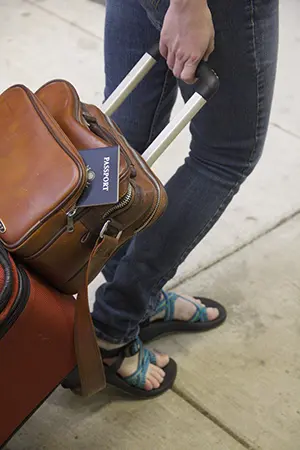
The Memorial Day weekend means that the school year is almost over, and it’s time for teens to travel! If your teenaged children are going to be traveling without you this summer, you’ll need to make sure they are prepared for their journey and can prove they have your consent for their travel. Whether your child is traveling within the US or venturing overseas, and whether they’re going to be totally solo, on a group tour, or traveling with an adult chaperone, there are special issues for travelers under 18.
Although there aren’t nearly as many logistics involved for a teen to travel alone, compared to a younger child, your teen will need to carry the right documents in order to be able to travel hassle-free.
Air Travel for Teens
Most airlines will allow teens over age 12-14 to travel alone without paying an unaccompanied minor fee. (For international flights, some airlines will require an unaccompanied minor fee for travelers up to age 17.) Before you book your child’s ticket, make sure to check the airline’s policy on unaccompanied minors. If your child is old enough to be exempted from the unaccompanied minors program, it’s great that you won’t have to pay an extra fee with your teen’s air ticket, but it does mean that they will need to navigate the airport alone.
As a parent, you’ll be able to enter the airport and help your teen check in for their flight. If you want to be able to accompany your child through TSA security, you can request an “escort pass” at the check-in counter. However, these may not be available at all airports, so we recommend that your teen be prepared to go through security alone. If your child is flying internationally, she will have to carry her valid passport book, which can be used as identification at the security checkpoint. For domestic flights, travelers under 18 are still allowed to travel without official identification, but we highly recommend that your teen carry identification. An official ID like a passport book, passport card, driver’s license, or learner’s permit is ideal. Even a student ID card is better than having no identification at all!
Bear in mind that if anything goes wrong – like a cancelled flight or a missed connection – your teen will need to deal with it on his own. When booking your child’s ticket, aim for non-stop flights, or flights with a generous amount of time to make the connection if there is a stop. It’s preferable to choose flights that are earlier in the day, so there will be more opportunity to be rerouted if your teen traveler’s flight is cancelled. It’s also good to be prepared with a back-up plan in case your child winds up having to wait overnight to catch a new flight. Most hotels will not allow travelers under age 21 to check in alone, so it’s a good idea to call around to hotels near the airports to check in advance if they would rent a room to your teen without an adult present.
Parental Consent for Travel
It’s always a good idea for teens to carry documentation proving they have parental consent for travel. For international travel, depending on your child’s destination, there may be specific documents required to prove parental consent.
A basic set of parental consent documents would include:
- A photocopy of your child’s birth certificate
- Photocopies of both parents’ identification (passports or driver’s licenses)
- A copy of the confirmed flight itinerary showing the return home
- An original, notarized letter signed by both parents giving consent to travel. We’ve included a sample letter at the end of this article.
 If your child will be traveling internationally, it’s important to check and see if the destination country has special requirements for travelers under age 18. You can confirm this by contacting the Embassy of the destination nation. For most countries, the basic parental consent documents listed above will be enough, but some countries have very stringent requirements. For example, the Philippines requires that minors traveling without their parents have a document called a “Waiver of Exclusion.” This document must be notarized and legalized by the Philippine Embassy in Washington before your child departs the US. South Africa is another example of a country with stringent entry requirements for minors, including a special Parental Consent Affidavit.
If your child will be traveling internationally, it’s important to check and see if the destination country has special requirements for travelers under age 18. You can confirm this by contacting the Embassy of the destination nation. For most countries, the basic parental consent documents listed above will be enough, but some countries have very stringent requirements. For example, the Philippines requires that minors traveling without their parents have a document called a “Waiver of Exclusion.” This document must be notarized and legalized by the Philippine Embassy in Washington before your child departs the US. South Africa is another example of a country with stringent entry requirements for minors, including a special Parental Consent Affidavit.
Another issue to consider is if your child will require a visa for their destination. Parental consent documentation will also be required in order for your teen to be issued a visa. Some countries, like India and China, even require proof that the parents hold valid passports. If your child’s destination offers a choice between getting a visa in advance or getting a visa on arrival (Cambodia, Indonesia, and Tanzania are examples), you may want to opt to have your teen get a visa in advance, to prevent any difficulties when they arrive on their own.
Families in which sole custody is held by one parent or by a legal guardian will also need to show documentation of the custody situation. The guidelines for parental consent for passports will also hold for parental consent for travel, too.
Other Documentation Your Teen Traveler Should Carry
- Health insurance card, and travel insurance information if you’re purchased a policy.
- A list of contact phone numbers. Don’t just rely on the contacts saved in your teen’s phone – make sure they have a paper backup in case the phone is lost, out of charge, or does not have service.
- A copy of their passport. If their passport is lost or stolen while traveling, having a copy makes it much easier to get a replacement.
- Sufficient funds in cash or traveler’s checks. Your child may not be able to use a credit card that’s issued in a parent’s name.
Sample Parental Consent Letter
Download Sample of Parental Consent Letter

